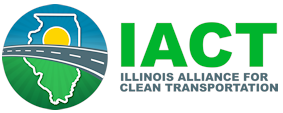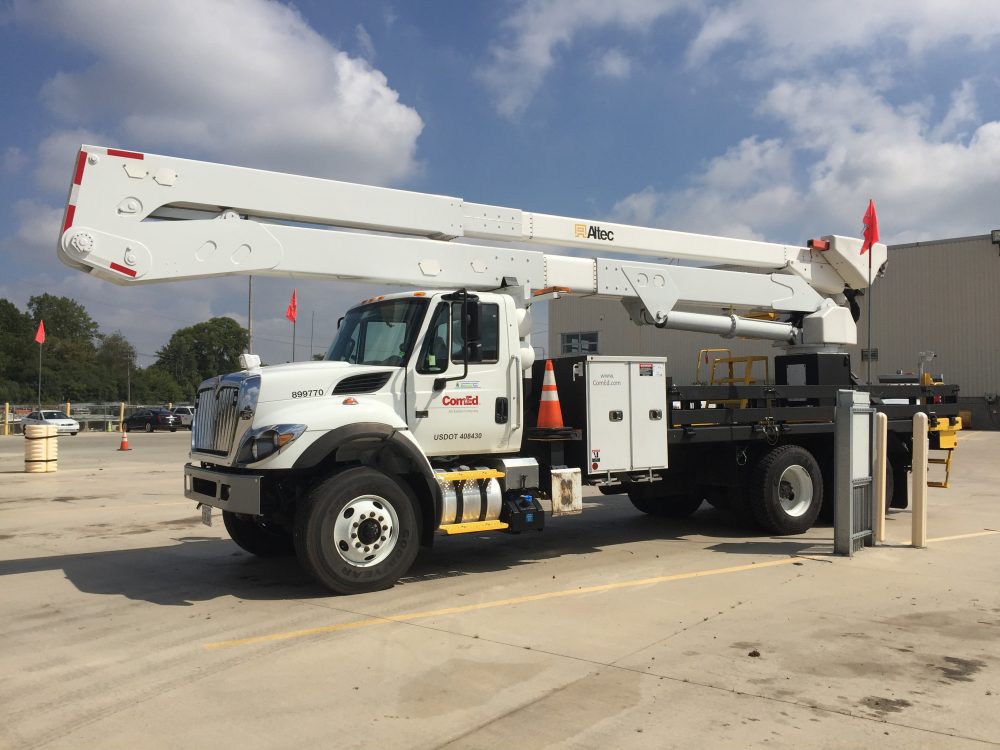CHICAGO, Feb. 12, 2019 – The Chicago Area Clean Cities Coalition today announced its Green Fleet Leadership Award winners, recognizing companies and government agencies that are leading in the adoption of alternative fuels and clean-vehicle technologies for their fleets.
This year’s winners include: ComEd, Chicago Park District, Chicago Transit Authority, City of Chicago, Village of Downers Grove, Jones Lang LaSalle/Aon and Prudential Towers, Nicor Gas, Schwan’s, United Parcel Service, and Waste Management. Each organization was recognized for its successful use of vehicles with alternative fuels and clean-vehicle technologies.
The Green Fleet Leadership Award winners were named at the coalition’s annual meeting at Hyatt McCormick Place. The awards are given annually to commercial or government fleets that take actions to locally reduce petroleum consumption and improve air quality, such as by using cleaner-burning alternative-fuel vehicles, electric vehicles or other advanced technologies.
“The commercial and government fleets that we’re awarding are being recognized for being the best in their fuel category in the reduction of greenhouse gas emissions and gasoline gallon equivalents of fuel,” said Samantha Bingham, coordinator, Chicago Area Clean Cities. “Many also are being recognized for year over year improvements. Their efforts are better for the environment by reducing harmful emissions, which improves Chicago air quality, ensuring that the air we breathe is cleaner for all.
“The fleets we’re honoring all operate in the Chicagoland area and are terrific examples for others to follow to learn about the advantages of clean-vehicle and alternative-fuel technologies,” Bingham said.
Green Fleet Leadership Award winners by category include:
Greenhouse Gas Reduction Award
- Commonwealth Edison Company (ComEd):ComEd is the primary electric utility in the Chicago area. A unit of Chicago-based Exelon Corporation, ComEd is the nation’s leading competitive energy provider, with approximately 10 million customers. In 2017, ComEd reduced its emissions of greenhouse gases by nearly 5,000 tons via its use of biodiesel fuel and electric vehicles to power its fleet.
Alternative Fuel Awards
Biodiesel
- ComEd: In 2017, the company reduced nearly 370,000 gasoline-gallon equivalents (GGEs) of fuel via its fleet of 1,750 trucks using cleaner-burning biodiesel fuel. ComEd provides service to approximately 4 million customers across northern Illinois, 70 percent of the state’s population.
- Chicago Park District: The Chicago Park District has a fleet of more than 550 vehicles, including nearly 200 vehicles that use a 10 to 20 percent blend of biodiesel, 56 that use up to 50 percent biodiesel, 80 that use E85 fuel, more than 50 hybrid-electric vehicles, and three that use clean-burning compressed natural gas (CNG). Through their sustainability efforts, the Chicago Park District reduces an equivalent of 19,000 gasoline gallons of fuel on average per year.
E85 Fuel
- The City of Chicago: The city has been a leader in the use of E85 fuel. In 2017, the city’s fleet used more than 750,000 gallons of E85 (ethanol) instead of traditional gasoline or diesel fuel. The city operates a fleet of 2,600 vehicles compatible with E85 fuel. Chicago also continues to increase its sustainability efforts and has committed to follow and adopt the guidelines of the Paris Agreement. Chicago is in the process of adding nearly 200 electric vehicles to the city’s fleet and installing DC Fast Charging Stations and Level 2 chargers. Chicago expects to have a passenger fleet that is 25 percent EV by 2023.
- Village of Downers Grove: The village in the western suburbs of Chicago had the greatest reduction in gasoline gallons equivalents of fuel of any of Chicago Area Clean Cities member fleets. It saved 22,500 gallons of fuel in 2017, a 100 percent reduction over 2016. This not only reduced greenhouse gas emissions, but it also improved local air quality.
Compressed Natural Gas (CNG)
- Waste Management: Based in Houston, Texas, Waste Management is the leading provider of comprehensive waste management services in North America. In 2017, Waste Management’s compressed natural gas (CNG) vehicles displaced 1.7 million GGEs of petroleum-based fuel in the Chicagoland area by using cleaner-burning CNG fuel. Across the U.S., Waste Management’s fleet includes more than 6,000 natural gas trucks, the largest heavy-duty truck fleet of its kind in North America.
- Nicor Gas: Nicor Gas is the largest natural gas distribution company in Illinois, serving 2.2 million customers in the northern third of the state. The company operates more than 2,250 fleet vehicles and pieces of equipment. Approximately 45 percent of the fleet operates using a variety of alternative fuels, including E85, biodiesel and CNG. In 2018, the company displaced nearly 990,000 equivalent gallons of petroleum with alternative fuels.
Liquid Propane Gas
- Schwan’s Company: Based in Minnesota, Schwan’s Company is a privately held business that manufactures and markets quality foods through home-delivery, retail-grocery and food-service channels. Its many popular brands include Red Baron®, Tony’s®and Freschetta®pizza, Smith’s®and Edwards®desserts, Villa Prima® pizza and Minh® Asian appetizers, and Schwan’s®fine frozen foods. In the Chicago area in 2017, Schwan’s reduced its use of fuel by an equivalent of nearly 95,000 GGEs, a 58 percent increase in GGE reduction.
Electric and Hybrid-Electric Vehicles
- Chicago Transit Authority (CTA): On an average weekday, CTA provides approximately 1.6 million rides on its transit bus and rail systems, which cover the City of Chicago and 35 surrounding suburbs. The CTA operatesnearly 240 hybrid-electric transit buses, two all-electric transit buses, and 24 hybrid electric passenger vehicles. In 2017, the CTA’s hybrid and electric fleet reduced its fuel consumption by more than 110,000 GGEs using these cleaner electric and hybrid-electric vehicles.
- United Parcel Service: UPS operates one of the industry’s largest private alternative fuel and advanced technology fleets, a “rolling laboratory” of approximately 9,300 vehicles that drives more than 1 million cleaner miles each business day. In 2017, the company tripled its GGE reductions in the Chicagoland area to more than 75,000. UPS operates 187 (117 LNG, 50 hydraulic hybrid and 20 hybrid-electric) alternative-fuel vehicles in the Chicago region, including 20 electric and hybrid-electric vehicles.
All-in Award
- Jones Lang LaSalle/Aon and Prudential Towers received the coalition’s “All-In Award,” to recognize its 100 percent all-electric shuttle bus fleet. The buses shuttle hundreds of commuters every workday from Chicago’s Metra train stations to the Aon Center and Prudential Plaza (JLL manages both buildings), then back again at the end of the day before parking underneath Wacker Drive to charge overnight.
CACC also recognized Pace Suburban Bus, Chicagoland’s suburban bus and regional paratransit provider, as its Clean Fuels Champion for its deployment of more than 90 clean-burning CNG buses and fueling stations. The awards ceremony was held to coincidence with the 2019 Chicago Auto Show.
At the meeting, Tony Lindsay of the Gas Technology Institute was honored with a “Chairman’s Award” for his 25 years of service to the coalition. Walton, who started working with CACC in 2001 when he converted the Forest Preserve District of DuPage County’s fleet to alternative fuels, received a Lifetime Appreciation Award. Walton serves as CACC’s chair, and Lindsay is Board Member Emeritus.
Chicago Area Clean Cities, celebrating its 25th anniversary this year, is a nonprofit coalition focused on promoting clean transportation in Chicago and the surrounding suburbs. The coalition’s membership is comprised of federal, state and local governments, corporations, small businesses, and individuals. These stakeholders come together to share information and resources, educate the public, help craft public policy, and collaborate on projects that reduce petroleum use.
“Over the past 25 years, our team has supported local actions to improve the environmental performance and efficiency of public and private fleets in the six-county Chicago metro area,” Walton said. “Our member fleets have reduced hundreds of millions of gallons of petroleum and millions of tons in greenhouse-gas emissions. Through Drive Clean Chicago and other grant programs, we’ve worked to help distribute millions in grant funding for clean vehicles and alternative-fuel stations. Proudly, we also have helped many fleets convert to the use of cleaner, more sustainable alternative fuels and clean-vehicle technologies.”
The coalition is one of more than 90 coalitions across the country affiliated with the U.S. Department of Energy’s Clean Cities program, which brings together stakeholders to increase the use of alternative fuel and advanced-vehicle technologies, reduce idling, and improve fuel economy and air quality. The coalition concentrates its efforts on educating businesses and municipalities in the six-county Chicago region, including Cook, DuPage, Kane, Lake, McHenry and Will counties.
CACC also is a partner in Midwest EVOLVE, a seven-state project to educate consumers about the advantages of electric vehicles, and is hosting electric vehicle test drives for consumers at this week’s Chicago Auto Show. Learn more at chicagocleancities.org.
News Media Contact:
Joe Koenig
Make Ideas Reality Communications
(708) 613-5005
Twitter: @ChiCleanCities



